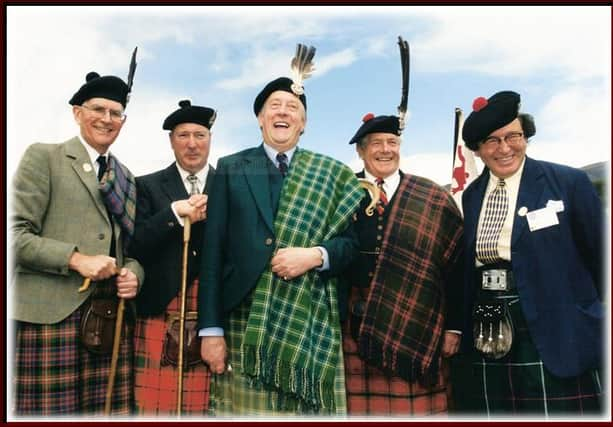Scottish Clan Voices: Macdonald


Its members may be found in tents and campervans at a west coast gathering or seated at a formal lunch to mark the anniversary of the Battle of Culloden.
In Glencoe, they may meet and share a song to mark their kinsfolk who were killed more than 300 years ago.
Advertisement
Hide AdAdvertisement
Hide AdContinued attempts are being made to mark the history and culture of Clan Donald, one of Scotland’s most widespread and distinguished clans, that bears several branches.
Today, Lord Macdonald of Macdonald, who lives at Kinloch Lodge on the Isle of Skye, is the 34th hereditary Chief of Clan Donald, a direct descendant of the ancient Lords of the Isles, who remained independent from the Scottish Crown until the 15th Century.
In Scotland, the Clan Donald Society of the Highlands and Islands was set up in 2010 at a time when similar groups in Edinburgh and Glasgow started to fade away.
In the north, there was a feeling it was “just all wrong” that such a society didn’t exist in the clan’s heartlands, according to its secretary Lois MacDonell of Glengarry.
According to Mrs MacDonell, the wife of the late 22nd Chief of Glengarry, the groups’ work is done in the spirit of “friendship and courtesy”both at home and abroad.
She added: "It is lovely in many ways but you soon realise that you must not take it too seriously and not take it too lightly."
Mrs MacDonell, said the gatherings were usually lighthearted affairs with the next big meeting a trip to Islay, the seat of the Lord of the Isles, this summer.
She said: “One couple usually comes in their campervan and another sleeps in his tent. He usually arrives on his scooter.”
Advertisement
Hide AdAdvertisement
Hide AdMrs MacDonell said the society was able to promote a sense of the familial for some.
She added: “People who tend to join the society tend to be childless and looking for a form of family.
“One of our chaps lives in the Central Belt where he is a security guard and is now divorced.
“He has linked up with us and he comes to everything that he can and he has found himself a family. That gives me more pleasure than anything else.”
Mrs MacDonell said she “completely understands” why people in Scotland did not embrace their clan heritage as much as those in the New World.
“You live in Scotland, you are a Macdonald, you live your life with the name Macdonald. You don’t need to prove anything.
“But for some people, they just want to know their roots and be connected.
“Most of our members I would say are more senior people. You don’t have as much free time when you are younger and I think when you get older, you do tend to wonder ‘where do I come from'."
Advertisement
Hide AdAdvertisement
Hide AdDescended from the 12th Century warlord Somerled, Clan Donald ruled over a huge swathe of the Highlands and Islands, from the territories held by the Lord of the Isles in the Hebrides, Kintyre and Ardnarmurchan to lands at Keppoch and Glencoe.
Always eager to take themselves to the “first press and dint of the battle”, Clan Donald received the honour from Robert the Bruce to fight on the right flank of the army at Bannockburn.
At Harlaw in 1411, they fought one of the bloodiest battles in Scottish history under the leadership of Donald, Lord of the Isles, in a clan bid to increase its territory on the mainland.
The Clan was also racked by infighting. Battle of Bloody Bay, one of western Europe’s biggest ever sea battles, was fought of off Tobermory, Mull, sometime between 1480 and 1483 as John Macdonald, Lord of the Isles, faced down a rebellion by his own son, Angus Og.
The conflict within Clan Donald continued as the power of the Lordship of the Isles reduced from the end of the 1400s.
At Culloden, Cland Donald split. While the majority of branches fought alongside the Jacobites, the MacDonalds of Sleat, whose historic seat is Armadale Castle on Skye, formed two battalions to support the British Government in order to keep hold of clan assets.
Every year, the society lays a flower on Culloden Moor at the memorial stone of Clan Donald, and the anniversary of the Massacre of Glencoe is also marked.
The deaths of 78 Macdonalds in 1692 following the killing spree led by Clan Campbell, which had been ordered by Crown, is a natural focus of remembrance for the Clan Donald Society.
Advertisement
Hide AdAdvertisement
Hide AdWhile clan rivalries were deep, brutal and lasting, today they manifest in little more than light joking, Mrs MacDonell claimed.
“My next door neighbours are Campbells -and I let them have a house key,” she said.